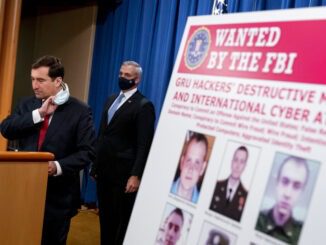WASHINGTON, D.C. — The Justice Department is sending a strong message about its priorities these days.
In just over the past two weeks, it has opened investigations of police in Louisville, Kentucky, and Minneapolis. Federal prosecutors have charged four former Minneapolis police officers with civil rights violations in George Floyd’s death, and accused three men of hate crimes in the death of Ahmaud Arbery in Georgia. In both criminal cases, authorities moved forward with federal charges before most of the defendants have gone to state trial.
Attorney General Merrick Garland is making good on his confirmation promise to refocus the department around civil rights.
“What we couldn’t get them to do in the case of Eric Garner, Michael Brown in Ferguson, and countless others, we are finally seeing them do,” the Rev. Al Sharpton said after the charges were announced in Floyd’s death.
Former Minneapolis officer Derek Chauvin has already been convicted of murder and manslaughter charges in state court and is scheduled to be sentenced June 25. The federal case could be insurance against a successful state appeal or a lenient sentence.
Separately, federal officials accused Chauvin in a 2017 case involving Chauvin’s arrest of a 14-year-old boy. Chauvin hit the boy with a flashlight and pinned him to the ground, putting his knee on the boy’s neck and back.
Chauvin’s lawyer, Eric Nelson, has filed a request for a new trial in Floyd’s death, citing a host of reasons, including publicity that was “so pervasive and so prejudicial … that it amounted to a structural defect in the proceedings.”
He also argued that the trial judge, Peter Cahill, abused his discretion when he denied earlier requests to move the trial. Cahill has not said when he would rule on Nelson’s request for a new trial.
Nelson had no comment on the federal charges.
The three other officers brought up on civil rights charges, Thomas Lane, J. Kueng and Tou Thao, haven’t been tried yet in state court on charges of aiding and abetting both second-degree murder and manslaughter in the Floyd case.
Usually, federal prosecutors hold off on any charges until local investigations are completed.
In the 1960s, federal authorities successfully prosecuted eight men involved in the 1964 disappearances and murders of civil rights workers Andrew Goodman, James Chaney and Michael Schwerner in Neshoba County, Mississippi, after local authorities said they did not have enough evidence to prosecute anyone.
One of the most high-profile uses of the federal statutes came in the 1992 Rodney King case in Los Angeles. Federal authorities charged four law enforcement officers with violating King’s constitutional rights in his videotaped beating. That decision came after a jury in Simi Valley acquitted the officers in the state case, prompting several days of riots in Los Angeles.
It’s not clear whether Garland was stepping in to aid local prosecutors in Minneapolis with the three officers, but it’s likely they are communicating about the cases. And the same in Georgia, where federal hate-crime charges were announced against Travis McMichael and his father, Gregory, and a third man, William “Roddie” Bryan, in the death of 25-year-old Ahmaud Arbery. The three are jailed on state murder charges and are due in court next week. Jury selection is scheduled to start Oct. 18.
Federal officials have also revived pattern or practice investigations. President Donald Trump’s attorney general, William Barr, suggested they may have been previously overused.
Federal officials have initiated broad reviews that will investigate Louisville police tactics following the death of Breonna Taylor in Louisville last year. A similar investigation into Minneapolis policing was announced the day after Chauvin was found guilty.
Those public announcements led to hope that the Garland Justice Department will take a fresh look at some closed investigations. The family of 12-year-old Tamir Rice, who was shot to death by a Cleveland police officer in 2014 while the boy was playing with a toy gun, wrote a letter to Garland asking the investigation be reopened into the officer.



